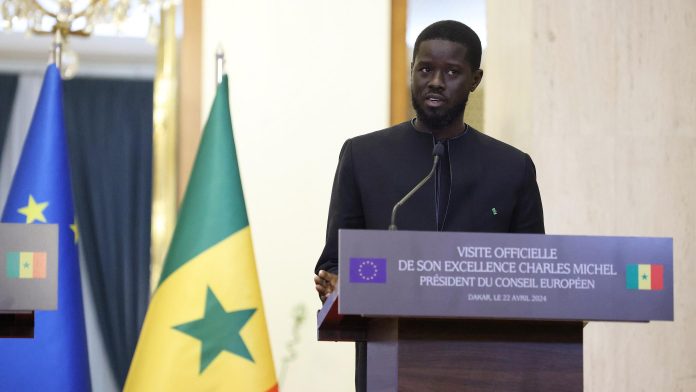On March 25, 1980, in the Thiès region of Senegal’s Ndiaganiao, Bassirou Diomaye Faye was born. Growing up in a humble environment, Faye graduated from Marie Médiatrice Catholic School in his community.
Though he is a practicing Muslim, his upbringing was distinguished by admiration of knowledge and public service, principles profoundly anchored in his family’s past. Having long been a member of the Socialist Party of Senegal, his father, Samba Faye, instilled in him progressive ideologies.
Senegalese Tirailleur Fay’s grandpa battled for France in World War I and subsequently got locked up because of a dispute with French colonial authorities over his attempts to create a neighborhood high school—an institution Bassirou himself ultimately attended.
Studying law at the distinguished Cheikh Anta Diop University in Dakar, Faye furthered his education.
Preparing for a career in public service, he continued his studies at Senegal’s National School of Administration. Professionally, Fay acquired experience and knowledge in financial management by becoming a public finance auditor. Serving as secretary general of the Tax and Domain Union, a major trade union concentrating on public finance experts, he showed a dedication to governance and workers’ rights.
Beyond his professional background in finance and law, Bassirou Diomaye Faye is famous for his culinary and agricultural hobbies. Though he is a zealous poet, he also cultivates crops like papayas and works on the fields during the rainy season to keep close ties with his rural beginnings. His close relationship with Senegal’s rural and traditional way of life is shown by this equilibrium between academic interests and practical farming activity.
Aspects of Senegalese culture and tradition are reflected in Faye’s personal life. Married to two wives—Marie Khone Faye, married in 2009, and Absa Faye, wed in 2023—he is polygamous. Marie Khone is a near relative; between them are three boys and one daughter. Faye has one Absa-daughter. Interestingly, he gave one of his boys the name of Ousmane Sonko, a close buddy and political partner. Furthermore showing his family-oriented upbringing, he also has a sister.
With the founding of the Patriotic Senegalese Party for Work, Ethics, and Fraternity (PASTEF) in 2014, Faye’s political career really started. Although Ousmane Sonko grew into the party’s charismatic leader and face for the public, Faye was instrumental in the background. The architectural approach of the party’s philosophy and internal structure was his work. He took over the strategic direction of PASTEF in October 2022.
At only 44 years old, Faye made history as the youngest president of Senegal by winning the March 2024 presidential election. On April 2, 2024, he was sworn in and immediately named Ousmane Sonko as Prime Minister, pointing to a close political alliance.
Soon, Fay created his administration stressing transparency and change. A hallmark policy of Faye’s government has been a determined move toward renegotiating important agreements, especially in the mining, oil, and gas industries. Originally a campaign pledge, this project has evolved into an ongoing process with the establishment of a special commission to assess strategic agreements and perform sectoral audits. This action seeks to guarantee more effective management of Senegal’s natural resources and more openness. Following a shift in political power, such renegotiations are not unheard of; comparable initiatives occurred in Bolivia (2006), Liberia and Sierra Leone (2008), and Guinea (2011).
In a nutshell, Bassirou Diomaye Faye’s ascent from humble beginnings to the highest position in Senegal is a reflection of his combination of academic rigor, cultural rootedness, and political savvy. His term heralds a generational shift and a greater emphasis on government, social values, and national sovereignty.




